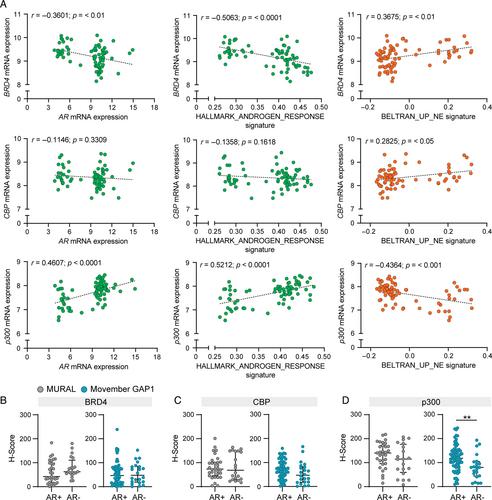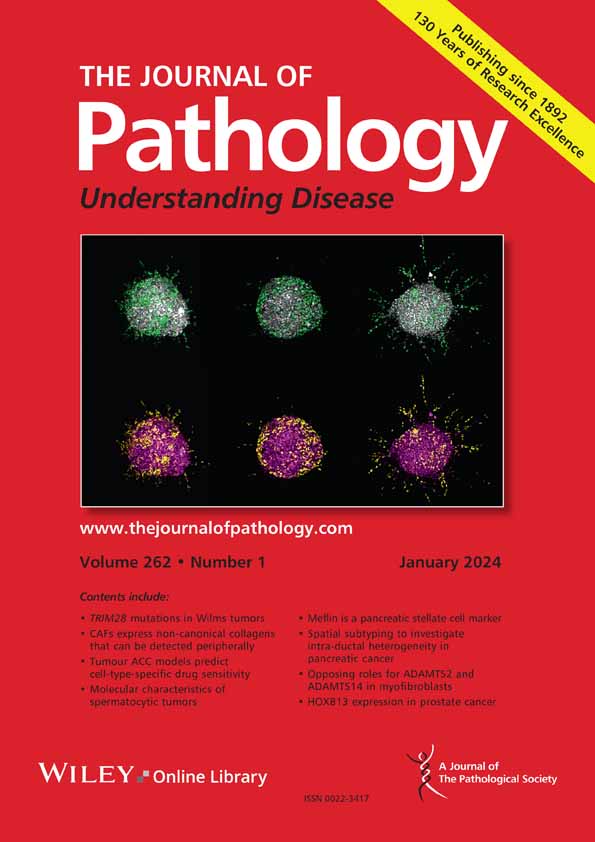下载PDF
{"title":"联合靶向 BET、CBP 和 p300 可抑制雄激素受体无效前列腺癌的神经内分泌信号传导","authors":"Nicholas Choo, Shivakumar Keerthikumar, Susanne Ramm, Daisaku Ashikari, Linda Teng, Birunthi Niranjan, Shelley Hedwards, Laura H Porter, David L Goode, Kaylene J Simpson, Renea A Taylor, Gail P Risbridger, Mitchell G Lawrence","doi":"10.1002/path.6280","DOIUrl":null,"url":null,"abstract":"<p>There are diverse phenotypes of castration-resistant prostate cancer, including neuroendocrine disease, that vary in their sensitivity to drug treatment. The efficacy of BET and CBP/p300 inhibitors in prostate cancer is attributed, at least in part, to their ability to decrease androgen receptor (AR) signalling. However, the activity of BET and CBP/p300 inhibitors in prostate cancers that lack the AR is unclear. In this study, we showed that BRD4, CBP, and p300 were co-expressed in AR-positive and AR-null prostate cancer. A combined inhibitor of these three proteins, NEO2734, reduced the growth of both AR-positive and AR-null organoids, as measured by changes in viability, size, and composition. NEO2734 treatment caused consistent transcriptional downregulation of cell cycle pathways. In neuroendocrine models, NEO2734 treatment reduced <i>ASCL1</i> levels and other neuroendocrine markers, and reduced tumour growth <i>in vivo</i>. Collectively, these results show that epigenome-targeted inhibitors cause decreased growth and phenotype-dependent disruption of lineage regulators in neuroendocrine prostate cancer, warranting further development of compounds with this activity in the clinic. © 2024 The Authors. <i>The Journal of Pathology</i> published by John Wiley & Sons Ltd on behalf of The Pathological Society of Great Britain and Ireland.</p>","PeriodicalId":232,"journal":{"name":"The Journal of Pathology","volume":"263 2","pages":"242-256"},"PeriodicalIF":5.6000,"publicationDate":"2024-04-05","publicationTypes":"Journal Article","fieldsOfStudy":null,"isOpenAccess":false,"openAccessPdf":"https://onlinelibrary.wiley.com/doi/epdf/10.1002/path.6280","citationCount":"0","resultStr":"{\"title\":\"Co-targeting BET, CBP, and p300 inhibits neuroendocrine signalling in androgen receptor-null prostate cancer\",\"authors\":\"Nicholas Choo, Shivakumar Keerthikumar, Susanne Ramm, Daisaku Ashikari, Linda Teng, Birunthi Niranjan, Shelley Hedwards, Laura H Porter, David L Goode, Kaylene J Simpson, Renea A Taylor, Gail P Risbridger, Mitchell G Lawrence\",\"doi\":\"10.1002/path.6280\",\"DOIUrl\":null,\"url\":null,\"abstract\":\"<p>There are diverse phenotypes of castration-resistant prostate cancer, including neuroendocrine disease, that vary in their sensitivity to drug treatment. The efficacy of BET and CBP/p300 inhibitors in prostate cancer is attributed, at least in part, to their ability to decrease androgen receptor (AR) signalling. However, the activity of BET and CBP/p300 inhibitors in prostate cancers that lack the AR is unclear. In this study, we showed that BRD4, CBP, and p300 were co-expressed in AR-positive and AR-null prostate cancer. A combined inhibitor of these three proteins, NEO2734, reduced the growth of both AR-positive and AR-null organoids, as measured by changes in viability, size, and composition. NEO2734 treatment caused consistent transcriptional downregulation of cell cycle pathways. In neuroendocrine models, NEO2734 treatment reduced <i>ASCL1</i> levels and other neuroendocrine markers, and reduced tumour growth <i>in vivo</i>. Collectively, these results show that epigenome-targeted inhibitors cause decreased growth and phenotype-dependent disruption of lineage regulators in neuroendocrine prostate cancer, warranting further development of compounds with this activity in the clinic. © 2024 The Authors. <i>The Journal of Pathology</i> published by John Wiley & Sons Ltd on behalf of The Pathological Society of Great Britain and Ireland.</p>\",\"PeriodicalId\":232,\"journal\":{\"name\":\"The Journal of Pathology\",\"volume\":\"263 2\",\"pages\":\"242-256\"},\"PeriodicalIF\":5.6000,\"publicationDate\":\"2024-04-05\",\"publicationTypes\":\"Journal Article\",\"fieldsOfStudy\":null,\"isOpenAccess\":false,\"openAccessPdf\":\"https://onlinelibrary.wiley.com/doi/epdf/10.1002/path.6280\",\"citationCount\":\"0\",\"resultStr\":null,\"platform\":\"Semanticscholar\",\"paperid\":null,\"PeriodicalName\":\"The Journal of Pathology\",\"FirstCategoryId\":\"3\",\"ListUrlMain\":\"https://onlinelibrary.wiley.com/doi/10.1002/path.6280\",\"RegionNum\":2,\"RegionCategory\":\"医学\",\"ArticlePicture\":[],\"TitleCN\":null,\"AbstractTextCN\":null,\"PMCID\":null,\"EPubDate\":\"\",\"PubModel\":\"\",\"JCR\":\"Q1\",\"JCRName\":\"ONCOLOGY\",\"Score\":null,\"Total\":0}","platform":"Semanticscholar","paperid":null,"PeriodicalName":"The Journal of Pathology","FirstCategoryId":"3","ListUrlMain":"https://onlinelibrary.wiley.com/doi/10.1002/path.6280","RegionNum":2,"RegionCategory":"医学","ArticlePicture":[],"TitleCN":null,"AbstractTextCN":null,"PMCID":null,"EPubDate":"","PubModel":"","JCR":"Q1","JCRName":"ONCOLOGY","Score":null,"Total":0}
引用次数: 0
引用
批量引用



